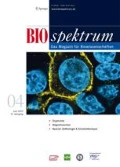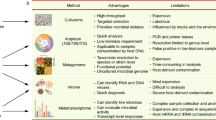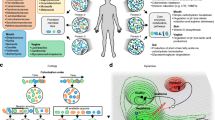Abstract
The concept of single-cell genomics lies in the recognition of each bacterial cell as a unique and distinct entity. Single-cell genomics employ phi29 polymerase and random hexamer primers to yield microgram-range genomic DNA from single microbial cells. The unprecedented insights obtained from single-cell genome analyses have allowed major advances in the fields of environmental microbiology, symbiosis, evolution, and bioprospecting.
Similar content being viewed by others
Literatur
Nature Editorial (2011) Microbiology by numbers. Nat Rev Microbiol 9:628
Ley RE, Turnbaugh PJ, Klein S et al. (2006) Human gut microbes linked to obesity. Nature 444:1022–1023
Bercik P, Denou E, Collins J et al. (2011) The intestinal microbiota affect central levels of brain-derived neurotropic factor and behavior in mice. Gastroenterology 141:599–609, 609.e1-3
Kamke J, Bayer K, Woyke T et al. (2012) Exploring symbioses by single-cell genomics. Biol Bull (im Druck)
Hutchison CA, Venter JC (2006) Single-cell genomics. Nat Biotechnol 24:657–658
Lasken RS (2007) Single-cell genomic sequencing using multiple displacement amplification. Curr Opin Microbiol 10:510–516
Blainey PC, Quake SR (2011) Digital MDA for enumeration of total nucleic acid contamination. Nucleic Acids Res 39:e19
Woyke T, Xie G, Copeland A et al. (2009) Assembling the marine metagenome, one cell at a time. PLoS ONE 4:e5299
Siegl A, Kamke J, Hochmuth T et al. (2011) Single-cell genomics reveals the lifestyle of poribacteria, a candidate phylum symbiotically associated with marine sponges. ISME J 5:61–70
Siegl A, Hentschel U (2010) PKS and NRPS gene clusters from microbial symbiont cells of marine sponges by whole genome amplification. Environ Microbiol Rep 2:507–513
Bayer K, Scheuermayer M, Fieseler L et al. (2012) Genomic mining for novel FADH2-dependent halogenases in marine sponge-associated microbial consortia. Mar Biotechnol. doi: 10.1007/s10126-012-9455-2
Siegl A (2009) Einzelzell-basierte Methoden zur Charakterisierung Schwamm-assoziierter Bakterien. Dissertation, Universität Würzburg
Hentschel U, Piel J, Degnan SM et al. (2012) Genomic insights into the marine sponge microbiome. Nat Rev Microbiol, doi: 10.1038/nrmicro2839
Author information
Authors and Affiliations
Corresponding author
Additional information
Kristina Bayer 1997–2004 Biologiestudium an der Universität Würzburg. Dort 2008 Promotion am Zentrum für Infektionsforschung. Seit 2008 wissenschaftliche Assistentin am Julius-von-Sachs-Institut für Biowissenschaften, Universität Würzburg.
Ute Hentschel Humeida 1986–1988 Biologiestudium, Universität Hannover; 1988–1994 Studium der Meeresbiologie und Promotion, Scripps Institution of Oceanography, La Jolla, CA, USA. 1995–1997 Postdoc, University of California, Santa Barbara, USA. 1998–2003 Arbeitsgruppenleiterin, Institut für Molekulare Infektionsbiologie, Universität Würzburg. 2004 Habilitation und Nachwuchsgruppenleiterin, Zentrum für Infektionsforschung, Universität Würzburg. Seit 2008 Professorin für chemische Ökologie am Julius-von-Sachs-Institut für Biowissenschaften, Universität Würzburg.
Rights and permissions
About this article
Cite this article
Bayer, K., Hentschel, U. Einzelzell-Genomik: das Bakterium als Individuum. Biospektrum 18, 596–598 (2012). https://doi.org/10.1007/s12268-012-0234-4
Published:
Issue Date:
DOI: https://doi.org/10.1007/s12268-012-0234-4




